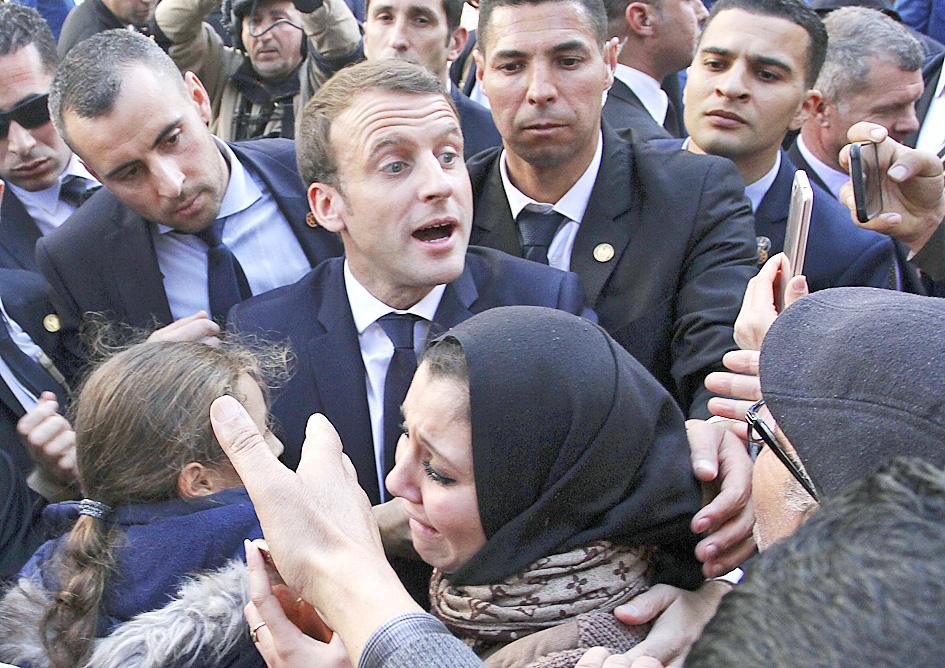Algeria on Saturday rejected “inadmissible interference” in its affairs, hours after recalling its ambassador from Paris following comments by French President Emmanuel Macron reported by French and Algerian media.
The Algerian Presidential Office said in a statement that it had withdrawn its ambassador following media reports of the French leader’s comments, which had not been denied.
The French daily Le Monde reported that Macron had made critical remarks about the former French colony during a meeting with descendants of figures from Algeria’s war of independence on Thursday.

Photo: AP
Macron reportedly said that the country was ruled by a “political-military system” and described Algeria as having an “official history” that had been “totally rewritten,” the paper reported.
He said that this history was “not based on truths,” but “on a discourse of hatred toward France,” Le Monde wrote, adding that Macron made clear that he was not referring to Algerian society as a whole, but to the ruling elite.
The statement from the Algerian presidency said: “Following remarks that have not been denied, which several French sources have attributed by name to [Macron], Algeria expresses its categorical rejection of the inadmissible interference in its internal affairs.”
Macron also spoke out on current Algerian politics.
Algerian President Abdelmadjid Tebboune was “trapped in a system which is very tough,” the French president was quoted as saying.
“You can see that the Algerian system is tired, it has been weakened by the Hirak,” he added, referring to the pro-democracy movement that forced Tebboune’s predecessor, Abdelaziz Bouteflika, from power in 2019 after two decades at the helm.
It is the second time that Algeria has recalled an ambassador from France.
It also recalled its ambassador in May last year, after French media broadcast a documentary about the Hirak.
Saturday’s move comes amid tension over a French decision to sharply reduce the number of visas it grants to people from Algeria, Morocco and Tunisia.
France said that the decision, which it announced on Tuesday, had been made necessary by the former colonies’ failure to do enough to allow illegal migrants to return.
The Algerian Ministry of Foreign Affairs on Wednesday summoned French Ambassador to Algeria Francois Gouyette and handed him a “formal protest” note concerning the visa ruling.
It called the visa reduction an “unfortunate act” that caused “confusion and ambiguity as to its motivation and its scope.”
Moroccan Minister of Foreign Affairs Nasser Bourita called the French move “unjustified.”
Tunisian President Kais Saied expressed disappointment with the decision in a telephone call with Macron on Saturday, his office said, adding that the French leader had said it could be revised.
French government spokesman Gabriel Attal told Europe 1 radio on Tuesday that the visa reduction decision was “unprecedented.”
Paris made that choice, he said, because Algeria, Morocco and Tunisia “are refusing to take back nationals who we do not want or cannot keep in France.”
The radio said Macron took the decision a month ago after failed diplomatic efforts with the three North African countries.

END OF AN ERA: The vote brings the curtain down on 20 years of socialist rule, which began in 2005 when Evo Morales, an indigenous coca farmer, was elected president A center-right senator and a right-wing former president are to advance to a run-off for Bolivia’s presidency after the first round of elections on Sunday, marking the end of two decades of leftist rule, preliminary official results showed. Bolivian Senator Rodrigo Paz was the surprise front-runner, with 32.15 percent of the vote cast in an election dominated by a deep economic crisis, results published by the electoral commission showed. He was followed by former Bolivian president Jorge “Tuto” Quiroga in second with 26.87 percent, according to results based on 92 percent of votes cast. Millionaire businessman Samuel Doria Medina, who had been tipped

ELECTION DISTRACTION? When attention shifted away from the fight against the militants to politics, losses and setbacks in the battlefield increased, an analyst said Recent clashes in Somalia’s semi-autonomous Jubaland region are alarming experts, exposing cracks in the country’s federal system and creating an opening for militant group al-Shabaab to gain ground. Following years of conflict, Somalia is a loose federation of five semi-autonomous member states — Puntland, Jubaland, Galmudug, Hirshabelle and South West — that maintain often fractious relations with the central government in the capital, Mogadishu. However, ahead of elections next year, Somalia has sought to assert control over its member states, which security analysts said has created gaps for al-Shabaab infiltration. Last week, two Somalian soldiers were killed in clashes between pro-government forces and

Ten cheetah cubs held in captivity since birth and destined for international wildlife trade markets have been rescued in Somaliland, a breakaway region of Somalia. They were all in stable condition despite all of them having been undernourished and limping due to being tied in captivity for months, said Laurie Marker, founder of the Cheetah Conservation Fund, which is caring for the cubs. One eight-month-old cub was unable to walk after been tied up for six months, while a five-month-old was “very malnourished [a bag of bones], with sores all over her body and full of botfly maggots which are under the

BRUSHED OFF: An ambassador to Australia previously said that Beijing does not see a reason to apologize for its naval exercises and military maneuvers in international areas China set off alarm bells in New Zealand when it dispatched powerful warships on unprecedented missions in the South Pacific without explanation, military documents showed. Beijing has spent years expanding its reach in the southern Pacific Ocean, courting island nations with new hospitals, freshly paved roads and generous offers of climate aid. However, these diplomatic efforts have increasingly been accompanied by more overt displays of military power. Three Chinese warships sailed the Tasman Sea between Australia and New Zealand in February, the first time such a task group had been sighted in those waters. “We have never seen vessels with this capability